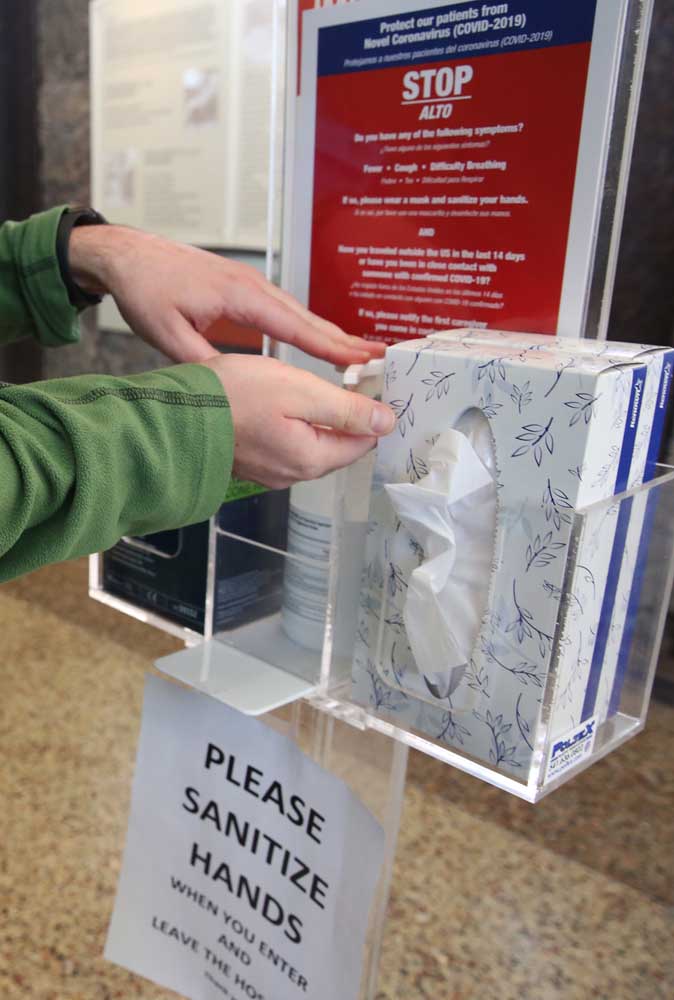Third coronavirus case identified in Oregon
Published 5:00 am Tuesday, March 3, 2020

- Signs direct people to use hand sanitizer at St. CharlesBend.
Concerns over coronavirus ratcheted up in Central Oregon Monday after Oregon health officials identified a third presumptive case and six people died in Washington.
The third case in Oregon involved a Umatilla County resident who is currently hospitalized in Walla Walla, Washington.
The person attended a basketball tournament. Health officials said Monday they are monitoring the people who may have been near the person. Those nearby people are considered “low risk.” The person is a staff member at the Wildhorse Resort and Casino at the Confederated Tribes of the Umatilla Indian Reservation. The casino closed at noon on Monday while workers sanitized the facilities.
More than 3,000 people have died worldwide from the virus that emerged in Wuhan, China, at the end of last year. While the number of new cases has declined in China, the virus is widespread in South Korea, Iran and Italy.
“With the third case identified over the last few days, we expect it will spread throughout (the U.S.),” said Dr. Dean Sidelinger, Oregon Health Authority state health officer and epidemiologist. “We know people are scared. Oregon health centers are prepared.
“Viruses don’t discriminate. All of us are at risk.”
Currently 86 people are being monitored in Oregon, according to data provided by the health department. Initially health officials believed the disease would spread from those who had traveled to China, but the three Oregon cases had no known travel contact, Sidelinger said.
“We don’t want to cause panic,” said Joseph Fiumara, Umatilla County health director. “Our entire public health team is diligently working away on finding the link and identifying those at risk. We are overloaded with calls at this time.”
Within St. Charles Health System, the operator of Central Oregon’s hospitals and the region’s largest employer, care is being given to ensure that patients and workers are protected from the virus. Masks are available at the entryways. Masks, which have been snapped up off store shelves in the past week, are not necessary unless someone has a fever, dry cough or shortness of breath.
Surgical masks only prevent the wearer from spreading germs, not from catching germs, said Dr. Robert Pfister, St. Charles Health System chief safety and quality officer. Since the most common transmission is direct contact, the best preventative measures are handwashing and avoiding those who are sick.
“I don’t encourage people to seek testing if you have mild symptoms, but if you have more severe symptoms such as shortness of breath, difficulty breathing and a fever, then contact your medical professional,” Pfister said. “The symptoms of influenza and COVID-19 overlap. The best thing you can do is stay home.”
At the moment, people who are most at risk of having severe symptoms are those who are older than 65 and those who have underlying illnesses that compromise their immune systems, he said.
“The virus is very rarely affecting patients under the age of 15,” Pfister said.
In places where there are large congregations of people, the best defense is good handwashing and not touching the hand and face, he said.
Zach Bass, Redmond Airport director, said messages are being posted throughout the airport about how to reduce transmission of the virus. On Monday, Alaska Airlines announced it would step up its aircraft cleaning and would waive ticket change and cancellation fees on recent ticket purchases. American, Delta, United and JetBlue airlines also are waiving fees.
“We are keeping the terminal clean and sanitized with focused disinfection of door handles and railings,” Bass said. “At this time, no one at Transportation Security Administration or airport staff are wearing masks.”
How can you tell if you’re sick from COVID-19 vs. seasonal influenza?
The symptoms of COVID-19 are more focused on fever, cough, fatigue and malaise.
Both cause fever, cough, body aches and fatigue. Flu and COVID-19 coronavirus can be mild or severe. Both can be spread by droplet (spit) person to person.
The symptoms of seasonal influenza typically have headaches, more severe muscle aches and intestinal problems.
In the 2017-2018 flu season, there were 61,000 influenza-related deaths, according to the Centers for Disease Control and Prevention.
In the 2018-2019 flu season, which has not ended yet, the CDC estimates there will be 34,200 deaths.
Source: St. Charles Health System, Dr. Robert Pfister and Johns Hopkins Medicine
Eighty percent of COVID-19 illnesses are very mild.
Typically, one person infected with COVID-19 coronavirus can infect up to 2.28 people. The seasonal flu can infect about 2.50 people. The measles can infect about 15 people.
The incubation period is not known at this time for COVID-19. Some reports from China suggest longer incubation periods. Typically the incubation period can be as long as 14 days; for measles, incubation ranges seven to 21 days; seasonal flu, is one to four days.
Source: St. Charles Health System, Dr. Robert Pfister
Symptoms of COVID-19 are much like the symptoms of influenza and other viral illnesses circulating this time of year. Of the people with confirmed cases in China, these are their symptoms by percentages: fever (87.9%), dry cough (67.7%), fatigue (38.1%), mucus production (33.4%), shortness of breath (18.6%), sore throat (13.9%), headache (13.6%), muscle or joint pain (14.8%), chills (11.4%), nausea or vomiting (5.0%), nasal congestion (4.8%), diarrhea (3.7%), coughing up blood (0.9%), and inflamed/red eyes (0.8%).
Source: World Health Organization China Joint Mission on Coronavirus Disease 2019
How to prevent COVID-19, coronavirus:
- Wash hands often with soap and water. If not available, use hand sanitizer.
- Avoid touching your eyes, nose, or mouth with unwashed hands.
- Avoid contact with people who are sick.
- Stay home while you are sick and avoid close contact with others.
- Cover your mouth/nose with a tissue or sleeve when coughing or sneezing.
- If you are traveling overseas, follow the CDC’s guidance: wwwnc.cdc.gov/travel.
Source: Deschutes County Public Health Department






